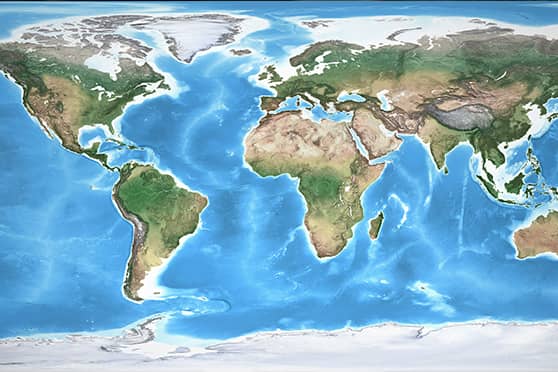Summary
Admission to Graduate and undergraduate courses depends on cut-offs and entrance exams
Geography offers exciting career paths like cartography, climatology and geoscience
If you want to learn more about the interaction between communities and their physical surroundings, then you can opt for Geography in your graduate and postgraduate studies. Encompassing the features of both Social Sciences and Physical Sciences, this subject equips you with portable skills and an analytical mindset.
Studying Geography
- You need to clear your Class XII board exams in either Humanities and Science stream with Geography as a subject to get admission to a BSc/BA course in Geography.
- After your graduation, you may go for MA/MSc courses in Geography. Your admission will depend on your score in the BA/BSc exams or your score in the university entrance exam, depending on the mode of admission.
- You can pursue either MPhil or PhD in Geography after completion of your master’s course.
Some popular institutes for studying Geography
Jadavpur University, Kolkata
Course offered: BSc in Geography.
-
Eligibility: You need at least 75% aggregate in your Class XII exams with Maths and any two subjects from Physics, Chemistry, Geography, Geology, Statistics and Economics.
Course offered: MSc in Geography.
-
Eligibility: You need at least 65% marks in your BSc in Geography (Honours/Major) with any of the following as pass subjects: Maths, Stats, Economics, Physics and Chemistry.
-
Duration: Two years.
Presidency University, Kolkata
Course offered: BSc in Geography.
-
Eligibility: You need at least 70% marks in your Class XII exams with at least five recognised subjects, including English.
Course offered: MSc in Geography.
-
Eligibility: You need at least 55% marks in your BSc course in Geography (Honours/Major) or a CGPA score of 6.6.
-
Duration: Two years.
Banaras Hindu University (BHU), Varanasi
Course offered: BA/BSc in Geography.
-
Eligibility: You need at least 50% aggregate in your Class XII board exams to appear for an admission test.
-
Admission: Depends on your score in the BHU Undergraduate Entrance Test (BHU UET).
Course offered: MA/MSc in Geography.
-
Eligibility: You need at least 50% marks in your BA/BSc course in Geography (Honours) to appear for an admission test.
-
Duration: Two years.
-
Admission: Depends on your score in the BHU Postgraduate Entrance Test (BHU PET).
Jamia Milia Islamia, New Delhi
Course offered: BA/BSc in Geography.
-
Eligibility: You need at least 50% marks in your Class XII board exams to appear for an entrance exam.
-
Admission: Depends on your score in the entrance exam.
Courses offered: MA/MSc in Geography and MSc in Disaster Management and Climate Sustainability studies.
-
Eligibility: You need 50% or above marks in your BSc course in Geography (Honours) to appear for an entrance exam.
-
Duration: Two years.
-
Admission: Depends on your score in the admission exam conducted by the department concerned.
Jawaharlal Nehru University, New Delhi
Course offered: MA in Geography
-
Eligibility: You need a bachelor’s degree under the 10+2+3 pattern of education with at least 45% marks.
-
Duration: Two years.
-
Admission: Depends on your score in the JNU Entrance Exam conducted by the National testing Agency.
Some colleges under the University of Calcutta for BA/BSc in Geography:
- Asutosh College
- Lady Brabourne College
- South Calcutta Girls’ College
- Loreto College
- Sivnath Sastri College
- Gokhale Memorial Girls’ College
- Jogamaya Devi College
- Vidyasagar College
Job roles with a Geography degree
-
Urban and regional planner: They use a variety of tools and technologies to gather and analyse data from market research, censuses and economic and environmental studies to come up with transportation planning, community development, historic preservation and urban designing.
-
Climatologist: They are experts who study weather patterns over a long period of time. They watch and monitor weather trends over years to prepare a climate dataset.
-
Geomorphologist : They study the history of landforms and also explore the reasons behind their creation. They focus on the effects of rivers, mountains, oceans and glaciers in shaping such landforms.
-
Cartographer: They collect, measure and interpret geographical information and create or update maps. Their job is to design maps, graphics, illustrations and layouts.
-
Environmental specialist: They address chemical leaks or conduct regular environmental inspections to keep the pollution level in check. Their chief goal is to improve living conditions by analysing food, soil, water and air samples.
-
Survey researcher: They design surveys after analysing data and trends. for various research purposes on various topics in the government and private sectors.
-
GIS analyst: They work with the Geographic Information System (GIS) software to capture, manage and analyse data related to positions on the earth's surface like streets, buildings, population and vegetation.
-
Remote sensing specialist: They interpret and analyse aerial photographs and satellite images. They also use sensors to analyse data and resolve regional, national and global concerns.
Last updated on 10 Dec 2021

